unit2 b2
人教新课标七年级上册英语--Unit2B2
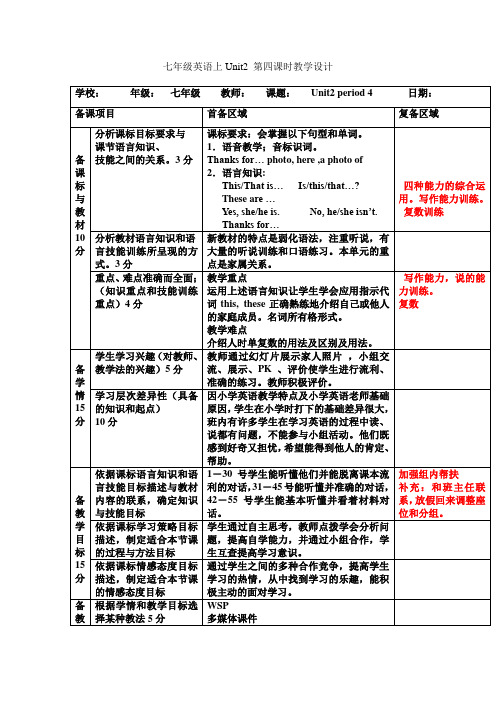
七年级英语上Unit2 第四课时教学设计Unit 3 This is my sister. Period 4 学案Step1 Groupwork:每个小组都准备好自己组表演的对话,上课后,全班被抽取三个小组展示。
一个小组在表演时,其他小组要安静,认真听,遵守课堂纪律。
根据表演的质量,不同程度的奖励。
我们组准备的情况:_________________________________________。
1.(A级:自己说出;B级:在帮助下说出;C级:跟着别人说出。
)我能做到:__________________________________________2.为自己喝彩:试着根据给出的汉语,拼出英语单词和词组。
(A级:自己拼出;B级:在帮助下拼出;C级:跟着别人拼出。
)我能做到:__________________________________________3.我最棒:试着根据给出的汉语,写出英语单词和词组。
(A级:自己拼出;B级:在帮助下拼出;C级:跟着别人拼出。
)我能做到:__________________________________________Step 3 Sentences-S1. 读准,读熟:A:读短信,划出重点短语;B:再读,尝试记住重点句子;C:能精确地读出语言点;D:跟读录音。
2. 运用所学语言知识,创造性的完成练习即写出句子:A:完成3b;B:完成4b;C:完成小组活动4b。
Step 4 Passage-P运用所写语言知识写出作文:A:小组讨论;B:展示建议;C:写出作文;D:组内互看,选出最好的一篇;E:组间互看。
Step 5 Homework1.完成作文。
2.准备下一节课,把作文说出来。
自我评价:我的不足:____________________________________________________________ 我的疑惑:____________________________________________________________。
高二英语选修B2 U2导学案

Unit2Improving yourselfSectionⅠStarting out&Understanding ideas重点短语:1.be persuaded to do被说服去做2.switch on开(电灯、机器等)3.on reflection经过慎重思考4.update one's profiles更新某人的概况5.miss out错失取乐(或获利等)的机会6.go round to访问,参观;拜访7.be up to正在干,从事着8.to be honest老实说,说实在的9.check out从(旅馆)结账离开;检查;10.throw in the towel认输11.resist doing(sth.)抵制做某事的诱惑12.social media accounts社交媒体账户13.catch up on了解(已发生的事)14.other than除...以外15.rely on依赖,依靠16.step away from远离Language Points1.(p18)教材原句p.14At the start of the detox,over100students had been persuaded to stop using social media...脱瘾活动初期,我们成功说服100多名学生不得使用社交媒体……be persuaded to do sth.被说服做某事He was persuaded to lay aside his own business and help the librarian to sort out the books.他被说服放下自己的工作,帮助图书馆管理员整理书籍。
[词汇复现]【归纳拓展】persuade sb.to do/into doing sth.说服某人做某事persuade sb.not to do/out of doing sth.说服某人不要做某事persuade sb.of sth.使某人相信某事persuade sb.that...使某人相信……【误区警示】persuade“说服”,强调劝说的结果;advise“建议”,强调劝说的动作。
U2 捷进英语B2 课文讲解Reading for Learnng
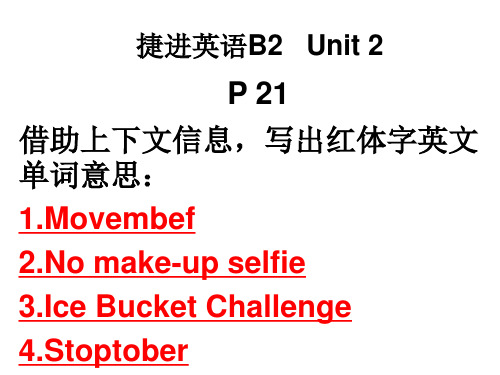
捷进英语2 P22 课文讲解Unit 2
• (What started始于as a small challenge小 型挑战between friends )grew very quickly 迅速壮大when some famous baseball players棒球运动员joined in. Since then,
Unit 2 捷进英语2 Reading for Learning课文讲解
• So did all the publicity如此高的曝光率 make much money for the charity为ASL 基金会募集到了善款? From 29 July to 28 August in 2014, ALS Association received $94.3 million 9,430 万美元, compared with 对比$2.7 million 270 万美元donated during the same period in 2013.
want to give myself a chance but also
give a lot of other people opportunity as well也.”
Unit 2 捷进英语2 Reading for Learning课文讲解
• In July 2014, Pete and his friend Pat Quinn started the Ice Bucket Challenge发起了“冰桶挑 战”. People have a bucket of iced water poured over their head从头上浇下and then nominate someone else点名其他人to do the same. Videos of it视频are then shared on social media社交网 站上分享. The nominee被点名的人can either accept and donate money to the ALS Association ALS 基金会or refuse拒绝挑战and donate more money. The more people take the challenge接受挑战的人the more money is raised 筹集.
Useful expressions of Unit2 B2 必修二第二单元常用表达法

Useful expressions of Unit2 B2 I、Phrases1.参加……比赛/竞争2.和某人对抗3.为了……而竞争4.与……媲美;比得上5.参加;参与6.代表;象征;表示;主张;容忍7.支持8.突出;坚持9.让开;站到一边;不参与10.承认做/做过某事11.承认……是……12.承认13.被接受进入;被……录取14.也;又;还15.也;和;还;和……一样好(在句中连接并列成分)16.取代……而成为……17.用……替换某人/某物18.取代;代替19.每四年20.主管;看管21.在……掌管之下22.负责;掌管23.免费24.为……向某人收费/要价25.指控某人某事26.为征求……而登广告27.在报上发布广告28.和某人就某事讨价还价29.和某人达成协议30.买得(不)合算31.应受……;值得……32.应该做某事33.比较级表示最高级的常用结构:34.站起来35.与某人赛跑36.计算出;弄明白;制定出;健身锻炼37.陆续的;一个接一个地38.除了……;除了……之外39.在……方面表现积极40.有信心做某事41.手拉手42.弄清,查明43.允许做某事44.允许某人做某事45.对某人表示敬意46.荣幸地做某事47.为向……表示敬意,为纪念……,为祝贺……48.承担一项任务49.责令某人做某事50.被指控谋杀51.因……向某人要价……52.娶某人;嫁给某人53.把某人嫁给某人54.结婚(表示状态)55.结婚(表示动作,不延续)56.无意间碰/遇到57.追赶;追求58.攻击,向……冲击59.走掉,跑掉60.撞上;无意间碰到61.(某物)用完62.用完(某物)63.(某物)快用完,不够用64.缺(某物),快用完(某物)65.许诺66.遵守诺言67.履行诺言68.不守诺言69.答应做某事70.应受处罚(奖赏)71.应受处罚72.目前II、Sentences1.Nobody ______________(allow) to take the magazine out of the reading room.2.Let’s ______________(弄清) his opinion before making a decision.3.They had a quiet wedding—only a few friends _____________(出席) it.4.Over 10,000 athletes __________________ the Athens Olympic Games in 2004.(参加)5.She admitted _____________(break) the window and begged the owner to forgive her.6.Shen Bing _______________(一直主持) a very popular television programme—Dialogue.7.The first Olympic Games in modern times ___________(hold) in 1896.8.The name of our country is PRC, which _____________(代表) the People’s Republic of China.9.People are not allowed __________(talk) freely at the meeting and they don’t allow___________(smoking) either.10.________________(每隔几天) he would go to see his old friend and have a talk.11.It is good manners to ____________________(对……表示尊敬) the elder.12.Our new library is so large that it can ____________(容许) 500 students to read in.13.John is not here today. Who can ____________(替代) him in the game?14.John will join the team __________________(代替) Jack.15.They set up a monument ____________________________(为了纪念) the hero.16.The 31st Olympic Games __________________(host) by Rio de Janeiro in the year 2016.17.The Mississippi River is longer than ___________ in Europe.A. any riverB. any other riverC. any other riversD. all the rivers18. We can go outing tomorrow. The bright stars ________ fine weather.A. tellB. showC. promiseD. hide19.—How long have they __________? —They __________ more than twenty years ago.A. got married; were marriedB. been married; got marriedC. married; marriedD. got married; got married20. Hundreds of jobs _______if the factory closes. A. lose B. will be lost C. are lost D. will lose III、完形填空One evening Mr Green was driving his car along a lonely country road. He had 1 £10,000 from the bank in the city. Suddenly a man 2 rags stopped him and asked for 3 . Mr Green told him to get on and continued his way. 4 he talked to the man, he learned that he had just broken out of 5 . Mr Green was very afraid at the 6 of the money. Suddenly he saw a police-car and then had a 7 idea. He 8 on the gas and drove as quickly as possible. Then he found the police-car running after him. After about ten minutes 9 the police-car got beyond and stopped him. A policeman came up. Mr Green had 10 to tell him about the trouble but the man put a gun to Mr Green’s 11 .The policeman said he wanted Mr Green’s name and 12 and Mr Green obeyed. The policeman wrote it down in his notebook and put it in his 13 . “You 14 appear at the police station,”he said. Then he talked to Mr Green about 15 driving.Mr Green started up his car again. He had 16 all of his hope of £10,000; but as he reached a more lonely part, the robber said he wanted to 17 . Mr Green stopped and the man said, “18 . You’ve been 19 to me. And this is what I can do in 20 .”With these words, he handed Mr Green the policeman’s notebook, which was stolen while the policeman was talking to Mr Green.1. A. taken B. held C. brought D. drawn2. A. with B. in C. on D. by3. A. money B. help C. a lift D. ride4. A. As B. Since C. Then D. Because5. A. police B. bank C. prison D. danger6. A. sight B. idea C. touch D. thought7. A. serious B. fast C. bright D. useful8. A. stepped B. handed C. sped up D. took up9. A. or so B. and fo C. and so on D. or so on10. A. managed B. begged C. asked D. hoped11. A. head B. shoulder C. back D. neck12. A. number B. home C. place D. address 13. A. car B. pocket C. hand D. trousers14. A. shall B. may C. would D. need15. A. careful B. fast C. careless D. dangerous16. A. given out B. given awayC. given upD. given in17. A. run away B. break awayC. set outD. get out18. A. I’m sorry B. You’re welcomeC. That’s all rightD. Thank you19. A. kind B. polite C. known D. necessary20. A. all B. fact C. return D. exchange。
柳埠一中八年级英语下Unit2B2课件华

Choose the best answer. 1.His teacher gave him _______. A. an advice B. some advices C. a piece of advice D. two piece of advice 2. He told us ______ in the river alone. A. swim B. not swim C. to swim D. not to swim 3. Do you know ______? A. what to do it B. how to do C. what to do D. when to do
4 Give your advice. Problems
You left your homework at home. Your best friend is more popular than you. You lost your sports clothes. You don’t know where your ID card is. You don’t want to have P.E. classes. Your parents always argue.
选词( 选词(组)填空。 填空。 I. also;too;either ; ; too 1. My mother, ________, is a doctor. 2. He ________ likes swimming in summer. also 3. My father didn’t go to the park, and I didn’t go there, ________. either 4. Are you going to the park tomorrow, ________? too
人教新目标九年级英语全册课时训练:Unit 2 Section B2 2a-2e
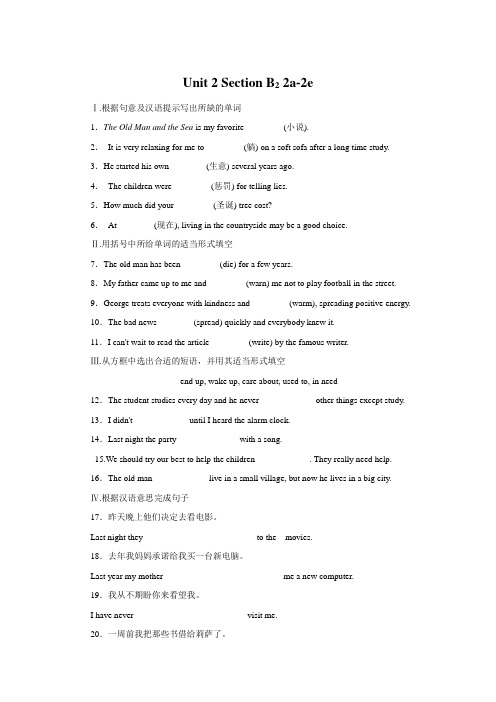
Unit 2 Section B2 2a-2eⅠ.根据句意及汉语提示写出所缺的单词1.The Old Man and the Sea is my favorite ________ (小说).2.It is very relaxing for me to ________ (躺) on a soft sofa after a long time study. 3.He started his own ________(生意) several years ago.4.The children were ________ (惩罚) for telling lies.5.How much did your ________ (圣诞) tree cost?6.At ________(现在), living in the countryside may be a good choice.Ⅱ.用括号中所给单词的适当形式填空7.The old man has been ________ (die) for a few years.8.My father came up to me and ________ (warn) me not to play football in the street. 9.George treats everyone with kindness and ________ (warm), spreading positive energy. 10.The bad news ________(spread) quickly and everybody knew it.11.I can't wait to read the article ________ (write) by the famous writer.Ⅲ.从方框中选出合适的短语,并用其适当形式填空end up, wake up, care about, used to, in need12.The student studies every day and he never ____________ other things except study. 13.I didn't ____________ until I heard the alarm clock.14.Last night the party ____________ with a song.15.We should try our best to help the children ____________. They really need help. 16.The old man ____________ live in a small village, but now he lives in a big city.Ⅳ.根据汉语意思完成句子17.昨天晚上他们决定去看电影。
人教新课标七年级上册英语--Unit2B2
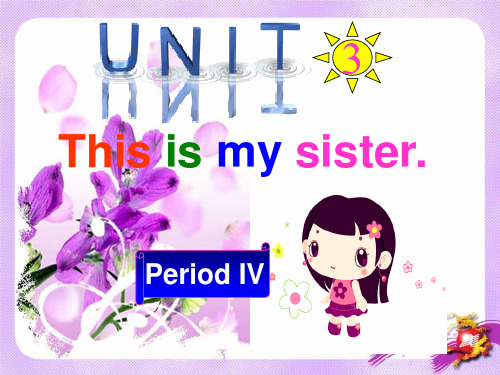
3a
Complete the passage with the words in the box. Then draw a picture of Paul’s family.选 词补全短文,然后画一张保罗的全家福。
brothers parents Cindy family
Hi. My name is Paul. This is a photo of my ________. family parents These are my ___________ and these are my ________, John and Bob. brothers This is my sister_________.
Homework
Bring a photo of your family to school and write a letter about it. Work in groups. Put the photos and the letters in different places. Then match the photos and the letters.
These are my grandparents.
Sentences
These are some photos of my family.这是我家的一些照片。
This is my father.
This is my mother.
These are my parents.
Sentences
These are some photos of my family.这是我家的一些照片。
The end of this part!
A BC
D
( A ) 2. These is my grandparent. _____ This
大学英语听力b2_listening_unit_2_Communication
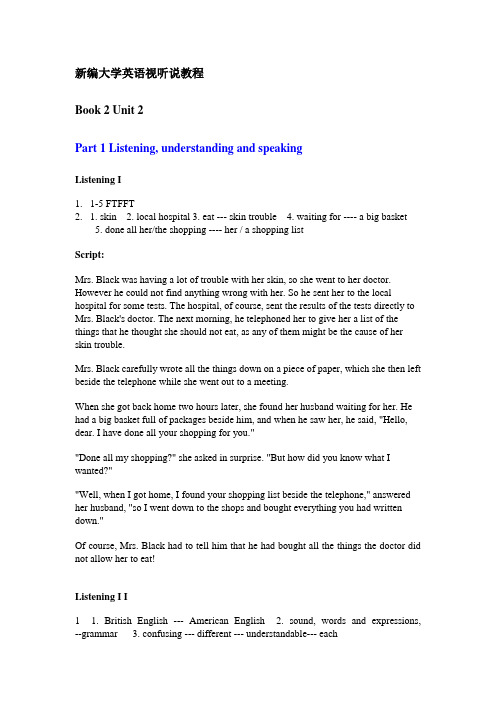
新编大学英语视听说教程Book 2 Unit 2Part 1 Listening, understanding and speakingListening I1.1-5 FTFFT2. 1. skin 2. local hospital3. eat --- skin trouble4. waiting for ---- a big basket5. done all her/the shopping ---- her / a shopping listScript:Mrs. Black was having a lot of trouble with her skin, so she went to her doctor. However he could not find anything wrong with her. So he sent her to the local hospital for some tests. The hospital, of course, sent the results of the tests directly to Mrs. Black's doctor. The next morning, he telephoned her to give her a list of the things that he thought she should not eat, as any of them might be the cause of her skin trouble.Mrs. Black carefully wrote all the things down on a piece of paper, which she then left beside the telephone while she went out to a meeting.When she got back home two hours later, she found her husband waiting for her. He had a big basket full of packages beside him, and when he saw her, he said, "Hello, dear. I have done all your shopping for you.""Done all my shopping?" she asked in surprise. "But how did you know what I wanted?""Well, when I got home, I found your shopping list beside the telephone," answered her husband, "so I went down to the shops and bought everything you had written down."Of course, Mrs. Black had to tell him that he had bought all the things the doctor did not allow her to eat!Listening I I1 1. British English --- American English 2. sound, words and expressions, --grammar 3. confusing --- different --- understandable--- each2. British EnglishI don’t know.What do you say?jumpertrouserschipschemist’s shopring them upHave you got an extra pen?Script:American and British people both speak English, of course, but sometimes it does not seem like the same language. In fact, there are some important differences between British and American English.First of all, they sound very different. Often, Americans don't say all the letters in each word. For example, Americans may say "I dunno" instead of "I don't know", or they may say "Whaddya say?" instead of "What do you say?"Sound is not the only difference between British and American English. The two languages have different words and expressions for some things. For example, some words for clothing are different. Americans use the word "sweater", but the British say "jumper". Americans wear "vests" over their shirts, but British people wear "vests" under their shirts. Americans talk about "pants" or "slacks", but the British talk about "trousers". The British chips are American French fries. A British chemist is an American drugstore. In Britain, if you are going to telephone friends, you "ring them up". In America, you "give them a call".There are also some differences in grammar. For example, Americans almost always use the helping verb "do" with the verb "have". They might say, "Do you have an extra pen?" The British often ask the question a different way. They might say, "Have you got an extra pen?"These differences can be confusing when you are learning English. But when the same language is used in different places, it is understandable that it changes in each place.Listening III11-6 T F F F F T21) small 2) pie 3) pine 4) big 5) small 6) pint 7) half 8) German9) warm 10) brown 11) English 12) a packet of 13) in the evening14) fried potatoes 15) crispsScript:Nick: Hi, Dieter. OK?Dieter: Oh, hi, Nick. Yes, I'm fine, except that I had a big problem ordering my drink.I didn't think my English was so bad!Nick: Your English is very good! What kind of problem?Dieter: Well, look at this beer I've got here—this warm, brown, English beer—it wasn't what I wanted!Nick: Why, what did you ask for?Dieter: Well, I just asked for a small beer. Then the barman asked what type of beer and said lots of names that I didn't understand—and something about a pie or a pine. I didn't understand anything!Nick: Oh, no! He probably said a pint! In English you don't ask for a big or a small beer. You ask for either a pint or a half. A pint's the big one.Dieter: So this one I've got here is a half?Nick: Yes, that's a half of bitter. Bitter's the name for that type of beer.Dieter: Ah, that's what he said—bitter! Well, it's very different from the beer we drink in Germany, I must say.Nick: Yes, I know. They call the German type of beer lager. So you have to ask for a half of lager, or a pint of lager.Dieter: OK. I understand that now. My another problem was chips. I asked for a packet of chips, and the barman said something strange—that they don't have chips in the evening, only at lunchtime. What did he mean?Nick: Yes, they have fish and chips, but I think you meant crisps. In England, chips are fried potatoes, you know, French fries. The ones you buy in a packet are crisps. Dieter: Well, in the end I didn't get anything to eat. So you see, I did everything wrong!Listening IV11-5 F T T F T2Examples: 1. MEN 2. HIS 3. MAN-madeConsequences: 1. mental image --- females/women 2. females/ women --- males/ men 3. citizensScript:(Mr. and Mrs. Jones are having a conversation one evening while Mrs. Jones happens to be looking at some of the textbooks her daughter, who is in the fifth grade, is using.)Mrs. Jones: Listen to what this book says. It really makes me angry! When talking about the settling of the western part of the U.S., it says, "MEN by the thousands headed west." Then on the very same page it says, "The average citizen in the United States is proud of HIS heritage."Mr. Jones: What's wrong with that? It's true. I don't understand why you are angry. Mrs. Jones: Why? Because women are left out!Mr. Jones: Everyone knows when the author says "men" or "his" in those sentences that the author means to include women.Mrs. Jones: I think you are wrong. When young people read these sentences, they simply do not form a mental image which includes females.Mr. Jones: Mm. Do you have other examples?Mrs. Jones: Yes I do! This book mentions "MAN-made improvements that have raised America's standard of living". A child will not think that females as well as males have made contributions when reading this.Mr. Jones: I still don't think it's very important.Mrs. Jones: Of course you don't! You're a man. But don't you want our daughter and other little girls to have the idea that they can be important citizens in their country, just as other women have been in the past?Mr. Jones: Well, I guess you're right. I hope not all textbooks are like that.Part 2 Viewing, understanding and speaking11-6 T F F F F T21) or another 2) seeing each other 3) boating 4) half an hour 5) someoneelse 6) anymore 7) Of course I do. 8) two different places 9) stupid Script:(The telephone rings in Julia's home, and she picks up the phone.)Julia: Hello!Michael: Hello, this is Michael.Julia: Hi, Michael. How are you?Michael: I'm fine. I miss you a lot though.Julia: Me, too. Can we get together again before you leave?Michael: Yes, sure! That's why I called you.Julia: Where should we meet?Michael: Mm, how about in front of Wanghu Hotel? (Some people are talking loudly in Julia's home.) That's not far from your home.Julia: Which hotel? I didn't hear you clearly.Michael: Wanghu Hotel.Julia: OK! What time?Michael: Mm, how about 12:30, tomorrow afternoon?Julia: OK, see you then.Michael: OK. OK, see you then.(In front of Wanghu Hotel, Michael is waiting. But Julia is waiting in front of Huanhu Hotel.)Michael: (He Looks at his watch, talking to himself.) It's 1:35 now! What's wrong with her?Julia: (She Looks at everywhere, hoping to see Michael, then talking to herself.) He's always late!Michael: (He Looks at his watch again, talking to himself.) Maybe she doesn't want to see me again?Julia: (She Looks at her watch, talking to herself.) It's almost 1:45 now! Where is he? Can it be that he is waiting at Wanghu Hotel? (Julia quickly rushes to Wanghu Hotel. There she sees Michael, who stands there waiting anxiously.)(In front of Wanghu Hotel.)Michael: Hi, Julia. You are so late. How come?Julia: I'm late?! I'm not late! I was waiting somewhere else! Believe it or not, I was waiting in front of Huanhu Hotel!Michael: Oh, my goodness! I've been waiting here for one hour. How come you went to Huanhu Hotel? I told you to come to Wanghu Hotel.Julia: But it sounded like Huanhu Hotel to me! You should've pronounced it more clearly.Michael: I'm sorry, but...but it never occurred to me you would have confused the two.Julia: I wish I'd realized that sooner, so that I wouldn't have waited there for so long. You know what? When you called yesterday, my mom had a group of friends over. They were so noisy that I could hardly hear you.Michael: That's why. Then how did you figure out that it might be here—Wanghu Hotel?Julia: Did it ever occur to you that we might be waiting at two different hotels? Michael: I guess not. I thought you were delayed by traffic or something.Julia: No! You don't think. Whenever we meet, we always have one problem or another.Michael: But last Saturday was all right. We had no trouble whatsoever seeing each other.Julia: It's always me who is waiting for you.Michael: That's not true! Wasn't I waiting for you today? And do you still remember the day when we went boating? I waited for you for about half an hour!Julia: If you don't want to wait for me, then wait for someone else.Michael: Julia, it's not that. You know what I mean.Julia: You just don't love me anymore.Michael: Of course I do. That's why I'm here. If I didn't love you, I wouldn't have waited here for an hour.Julia: But you never say "I love you" any more.Michael: Do you think I have to repeat the same three words all the time? Actions speak louder than words.Julia: But if you don't say it, how do I know?Michael: Come on, Julia. Don't be childish. Are we speaking the same language? It seems to me you always get me wrong.Julia: Well, if...if I hadn't realized what had happened we would still be waiting at two different places right now!Michael: Are you saying I'm stupid? Then why did you fall in love with me, then? Julia: Because I am even more stupid than you are! (Both laugh.)Michael: Now, let's forget it. Why don't we go for a walk in the park?Julia: Sure! (They walk away hand in hand.)Part 3 Video Appreciation and Singing for Fun1.Tip 1: Use open-ended questionsTip 2: Active listeningTip 3: The cocoonTip 4: Engage with the other personTip 5: Don’t make assumptionsTip 6: Avoid antagonistic sentences2. 1) closed questions 2) kill the conversation 3) summarizing 4) concentrate on 5) visualize a “cocoon”6) turn around and face that individual7) a particular topic 8) projecting your own thoughts or feelings9) a form of attack 10) a lot less conflictsPart 4 Further Speaking and ListeningListening I1) closer 2) regular 3) down 4) sense 5) envelope 6) convenience 7) instant 8) longer 9) positive 10) 2,252 11) quality 12) decreased 13) similar 14) inside 15) agreed 16) differentListening II1) status 2) definite 3) doubts 4) interrupt 5) power structure 6) establish and test 7) knowledge 8) power 9) sharing approach 10) encourageScript:At an early age, little girls' conversation is less definite and expresses more doubts, while little boys use conversation to establish status with their listeners.These differences continue into adult life. In public conversations, men talk more and interrupt other speakers more. In private conversations, men and women speak in equal amounts, although they say things in a different style. For women, private talking is a way to establish and test intimacy. For men, private talking is a way to explore the power structure of a relationship.Teaching is one job which shows the differences between men's and women's ways of talking. When a man teaches a woman, he wants to show that he has more knowledge, and hence more power in conversation. He uses his language to show this. When a woman teaches another woman, however, she is more likely to take a sharing approach and to encourage her student to join in.But it doesn't suggest that women are naturally more helpful. Actually, women feel they achieve power by being able to help others.Listening III1-5 F T F F TScript:Walking down the street, a dog saw an ad in an office window. "Help wanted. Must type 70 words a minute. Must be computer literate. Must be bilingual. Anequal-opportunity employer."The dog applied for the position, but he was quickly refused. "I can't hire a dog for this job," the office manager said. But when the dog pointed to the line that read "An equal-opportunity employer", the office manager sighed and asked, "Can you type?" Silently, the dog walked over to a typewriter and typed a letter without a mistake. "Can you operate a computer?" the manager inquired. The dog then sat down at a computer, wrote a program and ran it perfectly."Look, I still can't hire a dog for this position," said the office manager. "You have fine skills, but I need someone who's bilingual. It says so right in the ad."The dog looked up at the manager and said, "Meow."Listening IV1 1-6 T F T F T T2 1) an American education 2) fluent English 3) misses 4) nice5) little things 6) walking the dog 7) weather 8) snowy9) sunshine 10) boots 11) umbrella 12) a big smileScript:Ramon Romero is a seventeen-year-old boy from Bolivia. He speaks Spanish and a little bit of English.Ramon lives in the United States now, in Little Rock, Arkansas, with the Hutchinsons. They are not his real family. His real family is back in Bolivia. They cannot come to America because they have jobs and duties in their country and aren't able to leave. However, they do want their son to have an American education and be fluent in English.He misses his family and wishes to see them. It seems that no one understands his true feelings. It is difficult to listen to English all the time and then to express his thoughts in English. His American family is very nice to him and helps him in every way. In return, Ramon does little things to help the family. For instance, he takes the dog for a walk every morning and every evening.When he comes back from the morning walk, he tells Mrs. Hutchinson about the weather. This tells her how to dress her four-year-old son. On Tuesday, Mrs. Hutchinson asks, "How is the weather today?"Ramon answers, "It rain.""No, Ramon, in English we say, 'It's raining.'"On Wednesday, it rains again."It's raining today," reports Ramon.On Thursday, it snows. On Friday, the sun finally shines. Ramon is very happy that he doesn't have to wear boots or carry an umbrella. He comes into the house with a big smile on his face."How's the weather today?" asks Mrs. Hutchinson."Oh, today I am very happy," replies Ramon. "There is no weather."。
新人教版九年级英语 unit2 section B2-优质课件 (2).ppt

Santa Claus(圣诞老人)
传说每到12月24日晚上,有个神秘人会驾 乘由9只驯鹿拉的雪橇,挨家挨户地从烟囱 进入屋里,然后偷偷把礼物放在好孩子床 头的袜子里,或者堆在壁炉旁的圣诞树下。 虽然没有人真的见过神秘人的样子,但是 人们通常装扮成头戴红色圣诞帽子,大大 的白色胡子,一身红色棉衣,脚穿红色靴 子的样子,因为总在圣诞节前夜出现派发 礼物,所以习惯地称他为"圣诞老人"。
接龙
幻灯片上单词出现时,同学应 迅速读出该单词并说出意思, 说不出时,可有5秒钟的现场求 救时间(向其他同学),每名 同学接受求救不得超过3次。
Lead-in 1
Christmas Song Rudolph The Red Nosed Reindeer
Lead-in 2
What do you know about Christmas?
Christmas hat
Christmas stocking
reindeer
Santa Claus
a big meal
gift
Christmas ard
Christmas tree 。。。。
objectives
To learn some key words and useful expressions. To understand the true meaning of Christmas.
Look and say
warn
v.警告;告诫
To tell someone that something bad or dangerous may happen, so that they can avoid it or prevent it. He warns Scrooge to change his ways if he doesn’t want to end up like him.
Section B2 Unit 2 It's a nice day, isn't it

5. Which rules of small talk are the same in most cultures? It makes others feel relaxed and it passes time nicely.
6. Where do people often make small talk? People often make small talk at an airport or bus stop.
3 5 2 1 4
Paragraph_E____: What do people often talk about
PLpaaorroaagkgraarpaghpa_ihnA_d_a_ot_yt:hoHipneueooEtweponxlpdgepiolcfeaeecnssetdels?t?mnotWaeflnilhnctyade?lskt.hmIenaakwnehsowitcheherr Ptoartahgerafpohll_oB_w__in_g: Wquheasttkioinnds?of people use small
441.人教版四年级英语上册Unit 2 Part B 第三课时

Unit 2 Part B 第三课时一、听录音,选择你所听到的单词。
1. A. bag B. schoolbag C. ball2. A. Chinese book B. notebook C. English book3. A.toy B. boy C. tall4. A. maths B. maths book C. Chinese5. A. cap B. candy C. cake二、听录音,选出你所听到的句子。
1. A. I lost my schoolbag. B. I lost my notebook. C. I lost my keys.2. A. This my schoolbag. I have a toy and some candies in it.B. This my schoolbag. I have a notebook and a key in it.C. This my schoolbag. I have an English book, a note book and a toy in it.3. A. It’s blue and white. B. It’s black and white. C. It’s blue and black.4. A. Put your Chinese book in your desk.B. Put your notebook in your schoolbag.C. Put your storybook on your desk.5. A. What’s in your hand?B. What’s in your desk?C. What’s in your schoolbag?三、听录音,选出你所听到句子的正确答语。
1. A. A toy and a book. B. Blue and white. C. I like toy.2. A. I t’s a cap. B. It’s a book. C. It’s black.3. A. I like it. B. Thank you so much. C. I don’t know.4. A. It’s under your chair. B. A desk and a chair. C. It’s red.5. A. May I see it? B. Thank you. C. I like my schoolbag.四、根据提示,从下列字母组合中找出学过的单词,写在横线上。
B2 unit 2英语泛读
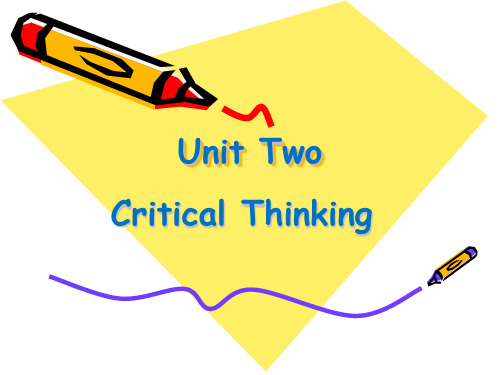
within the confines of in touch with reality basic structures integrated into
a whole make faulty inferences intensifying complexity
Summary & Assignments
Part 5: Standards of critical thinking
1. clarity 2. accuracy 3. precision 4. relevance
5. depth 6. breadth 7. logic 8. fairness
Part 5: Standards of critical thinking
Unit Two Critical Thinking
Outline
➢ Revision ➢ New lessons
1. Critical Thinking 2. Exercises ➢ Summary & assignments
Richard Paul
• As Director of Research and Professional Development at the Center for Critical Thinking and Chair of the National Council for Excellence in Critical Thinking, Dr. Paul is an internationally recognized authority on critical thinking, with 8 books and over 200 articles on the subject.
人教新目标英语八年级 Unit 2 Section B2 2a_-2e 同步练习题 含答案

[Unit 2 Section B2 2a2e]Ⅰ.根据句意及首字母提示,完成下列单词的拼写1.Do you know the r________ of the singing competition?2.Tom's grandpa d________ five years ago.3.Sixty p________ of the children like watching TV in our class.4.A________ he is old, he likes playing soccer with young people.5.You can't go t________ the forest. It's very dangerous.Ⅱ.用所给单词的适当形式填空6.Tina wants to go ________(camp) in the country this weekend.7.Some of my classmates dream of being ________(write) when they grow up.8.I was ________ (surprise) that my brother stayed up late last night to watch the football match. 9.It's interesting ________ (spend) time with my family on weekends.10.Eighty percent of the watches in this shop ________(be) from other countries.Ⅲ.根据汉语意思完成句子11.吉姆每周锻炼四至六次。
Jim exercises ________ ________ ________ ________ a week.12.那些学生一点儿都不喜欢吃蔬菜。
含听力pep五年级英语下册Unit 2 Part B第二课时练习题及答案
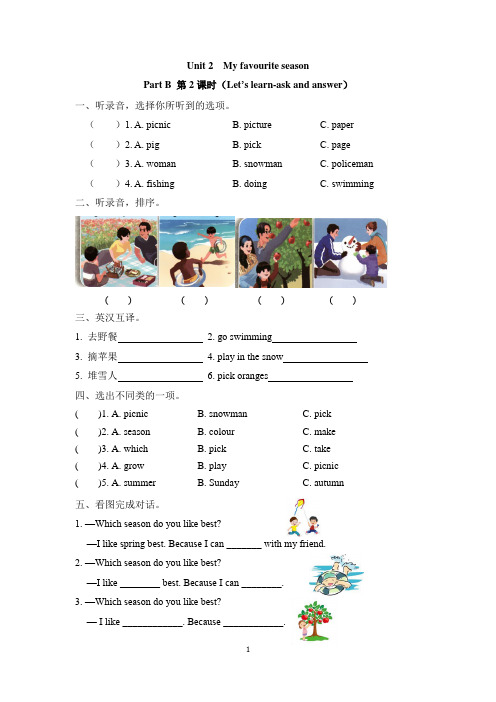
Unit 2 My favourite seasonPart B 第2课时(Let’s learn-ask and answer)一、听录音,选择你所听到的选项。
()1. A. picnic B. picture C. paper ()2. A. pig B. pick C. page()3. A. woman B. snowman C. policeman ()4. A. fishing B. doing C. swimming 二、听录音,排序。
( ) ( ) ( ) ( )三、英汉互译。
1. 去野餐2. go swimming3. 摘苹果4. play in the snow5. 堆雪人6. pick oranges四、选出不同类的一项。
()1. A. picnic B. snowman C. pick()2. A. season B. colour C. make()3. A. which B. pick C. take()4. A. grow B. play C. picnic()5. A. summer B. Sunday C. autumn五、看图完成对话。
1. —Which season do you like best?—I like spring best. Because I can _______ with my friend.2. —Which season do you like best?—I like ________ best. Because I can ________.3. —Which season do you like best?— I like ____________. Because ____________.4. —Which season do you like best?— ________________. ________________.5. — ________________?— ________________. ________________.六、按要求完成下列各题。
高中英语人教版(2019)必修第二册 Unit 2 教学设计(表格式)

B2 Unit 2 Listening & talking & Project
教学课时
共1课时
教学目标(目标要立足核心素养且清晰具体,可操作、可执行、可评价)
1.通过听力和阅读语篇,积累表达目的以及人类帮助动物活动的短语,提升语言能力。
2.通过在真实情境中拟定援救计划,应用所学,解决问题,提升思维品质和学习能力。
Assignment:
英语学习活动观:II&III
设计说明:通过落实到笔头,并以小组作业的形式,展示小组活动的结果。
备课反思
本节课设计了听力、阅读和小组活动等活动,活动主题是小动物救助。学生通过观看图片,听力训练,阅读文本,了解并熟悉鸟类观察所需的设备,鸟类俱乐部的活动以及小动物救助站的活动,最后根据真实情境,利用所学,帮助受伤的小鸟以及寒冬里无处觅食的小猫解决问题。学生通过这些活动,一方面掌握目的的表达以及人类活动的表达,同时也提升了保护野生动物的意识。
Q2: Who started it?
Q3:What animals were rescued?
Q4: What help does the center need?
Activity 6: Read and find out what people do to help the animals in the shelter.
3.通过小组活动,形成帮助野生动物的意识,并在生活中关爱小动物。
学习形式
课前:图片配对及完成句子,了解并熟悉观察鸟类的设备的英语表达;
课中:听力回答问题以及填空和阅读回答问题以及找出动词,整理目的表达的短语和人类帮助动物活动的短语;
课后:制订援助计划,帮助受伤的小鸟以及寒冬里无处觅食的小猫解决问题
2014 Unit 2 I think that mooncakes are delicious Section B2

3. dead adj. 死的;失去生命力的 They found him dead. die v. 死亡 death n. 死;死亡 He died at the age of 86. He is dying soon. The sick man is in danger of death.
用 die dead 或 death 完成下列句子。 died last year. 1. His grandfather ______ dead for a week. 2. The dog has been ______
this year.
the Ghost of Christmas Yet to Come?
He sees that he is dead, but nobody cares.
2d Answer the questions.
1. Why does Scrooge hate Christmas?
Because he doesn’t want to share and give love and joy to people around him. 2. Does Scrooge have a lot of friends? Why or why not?
Section B Period 2 (2a —2e)
2b Read and answer the questions.
1. What are the common things that people think of for Christmas?
Gifts,Christmas trees and Santa Claus.
1 lie behind 背后存在; 是 ... 的原因 I wonder what lies behind his decision to leave.
视听说文本B2Unit2-SectionTwo

视听说文本B2Unit2-SectionTwoB2 Unit 2 Culture and EducationSection Two Skills TrainingConversation OneLinda: Hello, Linda speaking.Jack: Hi, Linda. This is Jack.Linda: Great to hear from you, Jack. How are you doing?Jack: T o tell the truth, I’m worried about the English oral text next month. I can’t even sleep at night.Linda: Oh, I’m sorry.Jack: And that’s why I’m calling you. Since your English is so great, would you tell me how to practice oral English?Linda: Well, I think you’d better talk to English people.Jack: But … English people never speak to me.Linda: Ah! Most English people are a little bit shy. You should speak first.Jack: What can I talk about? What are they interested in?Linda: The weather! English people are always interested in the weather.Jack: But I can’t be talking about weather all the time. What else can I talk about?Linda: You can also talk about traveling. English people love traveling.Jack: Really? I l ove traveling, too. I think it’s a good topic for me.Linda: Yeah, that’ll give you very good chances to practice your English. And you’ll make great progress, I’m sure.Jack: Thanks, Linda. I will let you know how it goes.(193 words)Questions:1.What is the problem Jack worries about?2.Why is it hard for English people usually to speak to others first?3.What are the topics that may interest English people?4.What can we learn from the conversation?Keys: 1.B 2.C 3.A 4.DConversation TwoKathy: Bob, do you know how to meet and greet English people properly?Bob: Wow, I’m not really sure about that. Tell me something. For example, when I meet someone, I always say “How are you”. Is that right?Kathy: It’s OK if you are not in a hurry and have time to talk to him. But if you are just passing someone by, the simplest way is to say “good morning”.Bob: I see. And do they shake hands when meeting people?Kathy: When you first meet someone, it is OK to shake hands. With your friend, you may do it, but it is not necessary.Bob:Oh, I know. How should I call people, by their family names or their first names?Kathy: It is always safe to use the family name. Of course, it is customary to call his first name if he is a good friend or school-mate.Bob: Yeah, I see, it is safer to use a person’s family name, if he is not someone I am quite familiar with.Kathy: You got it. Oh, I have one more thing to tell you.Bob: What’s that?Kathy: If you are wearing a hat, it is polite to take it off when you greet a girl or a woman.Bob: Oh, it’s really helpful. I will keep it in mind.(224 words)Questions:1.What is the main topic in this conversation?2.According to the conversation, if you are in a hurry, how could you greet people?3.According to the conversation, who could be addressed by their first name?4.What can be inferred from the conversation?Keys: 1.A 2.B 3.C 4.A。
B2_U02_B课文
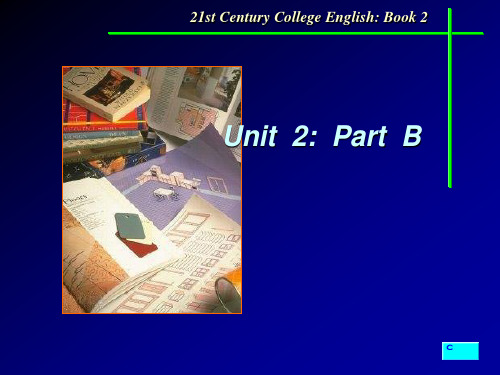
B) Some generalizations about Japanese educational values.
C) Some facts about recent education-system reforms
• Comprehension Check
Reading Skill
Predicting Content from the Topic Sentences
a very useful way to improve your
comprehension: Scanning a text before you read it
Text B: Intensive Study
2 The Canadian teacher was startled by the lesson. The teaching methods — and their effects — were very different from those in her own country. An art lesson in a Canadian school would lead to a room full of unique pictures, not a series of identical cats. Why? What causes this difference in educational methods?
Text B: Intensive Study
4 In many Western societies, such as the United States or Canada, which are made up of many different nationalities, religious groups and cultural orientations, individualism and independent thinking are highly valued. And these values are reflected by the education systems in these countries. Teachers emphasize the qualities that make each student special. Students are seldom expected to memorize information; instead, they are encouraged to think for themselves, find answers on their own and come up with individual solutions. At an early age, students learn to form their own ideas and opinions, and to express their ideas in class discussion.
Unit 2 Section B2 (2b-self-check)导学案 人教版八年级上册
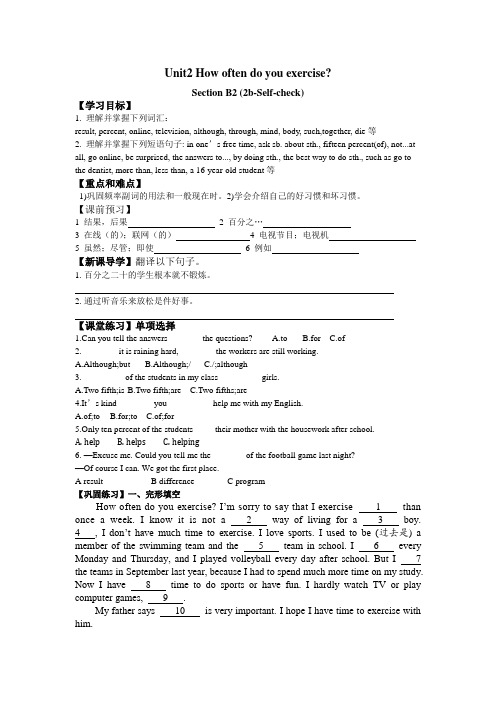
Unit2 How often do you exercise?Section B2 (2b-Self-check)【学习目标】1. 理解并掌握下列词汇:result, percent, online, television, although, through, mind, body, such,together, die等2. 理解并掌握下列短语句子: in one’s free time, ask sb. about sth., fifteen percent(of), not...at all, go online, be surprised, the answers to..., by doing sth., the best way to do sth., such as go to the dentist, more than, less than, a 16-year-old student等【重点和难点】1)巩固频率副词的用法和一般现在时。
2)学会介绍自己的好习惯和坏习惯。
【课前预习】1 结果,后果2 百分之…3 在线(的);联网(的)4 电视节目;电视机5 虽然;尽管;即使6 例如【新课导学】翻译以下句子。
1.百分之二十的学生根本就不锻炼。
2.通过听音乐来放松是件好事。
【课堂练习】单项选择1.Can you tell the answers________the questions? A.to B.for C.of2.________ it is raining hard,________ the workers are still working.A.Although;butB.Although;/C./;although3.________of the students in my class________girls.A.Two fifth;isB.Two fifth;areC.Two fifths;are4.It’s kind ________you ________help me with my English.A.of;toB.for;toC.of;for5.Only ten percent of the students ____ their mother with the housework after school.A. helpB. helpsC. helping6. —Excuse me. Could you tell me the________of the football game last night?—Of course I can. We got the first place.A resultB differenceC program【巩固练习】一、完形填空How often do you exercise? I’m sorry to say that I exercise 1 than once a week. I know it is not a 2 way of living for a 3 boy.4 , I don’t have much time to exercise. I love sports. I used to be (过去是) a member of the swimming team and the5 team in school. I6 every Monday and Thursday, and I played volleyball every day after school. But I7 the teams in September last year, because I had to spend much more time on my study. Now I have8 time to do sports or have fun. I hardly watch TV or play computer games,9 .My father says 10 is very important. I hope I have time to exercise with him.1. A. less B. more C. better2. A. bad B. healthy C. wrong3. A. 17 years old B. 17-year-old C. 17-years-old4. A. So B. Although C. However5. A. basketball B. tennis C. volleyball6. A. played football B. went swimming C. went online7. A. joined B. disliked C. left8. A. little B. few C. a few9. A. too B. also C . either10. A. play sports B. playing sports C. played sports二、从方框中选择合适的单词并用其正确形式填空Jane has a lot of good habits. She always exercises in the morning. She often eats vegetables and fruit. She ______1______ ever eats sweet food. Her teeth are good and she never needs to go to see the _____2_______ . ______3______ , she has some bad habits, too. She often watches TV for more than two hours a day. And she spends _______4_____ all the weekend time reading ______5______ for fun and doesn’t do her homework. _____6____ of her family are happy with her because the results of her tests are often less than 60 _____7____ . Jane decides to change ( 改变) from now on.【课后收获】回顾本课所学内容,你学到哪些知识?赶快写下来吧!。
- 1、下载文档前请自行甄别文档内容的完整性,平台不提供额外的编辑、内容补充、找答案等附加服务。
- 2、"仅部分预览"的文档,不可在线预览部分如存在完整性等问题,可反馈申请退款(可完整预览的文档不适用该条件!)。
- 3、如文档侵犯您的权益,请联系客服反馈,我们会尽快为您处理(人工客服工作时间:9:00-18:30)。
你会选择吗?
• 1. How often do you eat breakfast?___ a week. • A a few times B a few time C a little time • 2. ___ hours do they watch TV every week? • A how many B how much C how often • 3. My brother likes vegetables and fruit,__, he doesnit like milk. • A how ever B but C or • 4. She often goes to the dentist for___ • A tooth clean B tooth cleaning C teeth cleaning • 5. ____ do you eat junk food? • A how many B how often C how long
Talk about your good habits.
I read English books every day.
I always exercise.
I usually help with the housework.
I drink milk every day.
I never stay up late.
3b
Complete the chart with your own information. In the last column, use expressions like always, every day, twice a week and never.
Habits
Activities
How often every day always every day twice a week never
twice a week often hardly ever
never
3c
________________________________________ ___________________________________________________ ________________________________________
Exercise Read books Drink juice Stay up late Watch TV for over 2 hours Eat hamburgers Help with housework Go to the dentist
365 365 210 15 320 95 20 0
Jane is a 16-year-old high school student in the United States. American Teenager magazine asked her about her habits. Jane has a lot of good habits. She always every day exercises and she reads books ________. Also, she ________drinks juice and she usually __________ hardly ever stays up late.
A: _________ How often do they watch TV? B: Mike never watches TV, but Tom over two hours watches TV _________________ a day. never A: Oh, I’m just like Tom. I ________ watch TV, too.
你记住了吗?
• 1. We should eat more fruit and vegetables and l______ meat. • 2. She has a bad tooth , and she has to go to the d______. • 3. I like to go to the library to read books and m______. • 4. He goes online for more t_____ two hours in the evening. • 5. How often do the students use the Internet? • They use it a______ every day.
4. My father sometimes drinks tea.
5. I hardly ever watch TV. 6. My father never gets up early.
3. Fill in the blanks in the conversation. usually do A: What do Tom and Mike __________ on weekends? B: They sometimes go to the museum. How often do they go to the shopping A: ___________ center? B: _________ Hardly ever. Maybe about twice a month.
However, she has some bad habits, too. always watches TV for more than She _______ sometimes eats two hours a day, and she __________ hamburgers. Her parents are not very ever helps with happy because she hardly __________ housework and she ______ never goes to the dentist for teeth cleaning. She says she is afraid.
1. Do a survey in your family. Using
the questions and charts in Part 4.
2. Do Ex. 1 in the workbook.
Talk about your bad habits.
I watch TV for over two hours every day.
I use the Internet every day.
I often eat hamburgers.
I hardly ever go to the dentist (看牙医).
2. Write five sentences using the information above.
1. I always play basketball after school. 2. My father always plays chess on weekends. 3. I usually read books on weekends.
你能完成吗?
• 1. We have to learn more about ______(health) habits. • 2. How long do you sleep at night ? • I sleep eight or _____ (many ) hours. • 3. You are too heavy, you must try to eat ____(little) junk food.. • 4. Mike never ____(watch) TV, but he is often online. • 5. You're really _____(health),good for you and your____ (health) .
Now, it’s your turn. Try your best.
1. Complete the chart with activities you do and don’t do. What about your mother/father?
I always usually often sometimes hardly ever never
Exercise Read books Good Eat fruit habits Drink milk Stay up late
Habits
Activities
How often
always
Watch TV for over 2 hours Use the Internet Bad Eat hamburgers habits Help with housework Go to the dentist
I don’t like vegetables.
你能说出5个句子吗?
• 1. Good habits • 2. Bad habits
3a
Look at the information in the chart and complete the report.
Activities Days a year
One possible version:
I have lots of good habits. I exercise every day. I always read books. I eat fruit every day. I drink milk twice a week. I never stay up late. But I have some bad habits, too. I always watch TV for two hours a day. I use the Internet twice a week. I hardly ever help with housework. I never go to the dentist.
